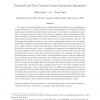Free Online Productivity Tools
i2Speak
i2Symbol
i2OCR
iTex2Img
iWeb2Print
iWeb2Shot
i2Type
iPdf2Split
iPdf2Merge
i2Bopomofo
i2Arabic
i2Style
i2Image
i2PDF
iLatex2Rtf
Sci2ools
108
click to vote
IOR
2008
2008
Promised Lead-Time Contracts Under Asymmetric Information
We study the important problem of how a supplier should optimally share the consequences of demand uncertainty (i.e., the cost of inventory excesses and shortages) with a retailer in a two-level supply chain facing a finite planning horizon. In particular, we characterize a multi-period contract form, the promised lead time contract, that reduces the supplier's risk from demand uncertainty and the retailer's risk from uncertain inventory availability. Under the contract terms, the supplier guarantees on-time delivery of complete orders of any size after the promised lead time. We characterize the optimal promised lead time and the corresponding payments that the supplier should offer to minimize her expected inventory cost while ensuring the retailer's participation. In such a supply chain, the retailer often holds private information about his shortage cost (or his service level to end customers). Hence, to understand the impact of the promised lead time contract on th...
Related Content
| Added | 12 Dec 2010 |
| Updated | 12 Dec 2010 |
| Type | Journal |
| Year | 2008 |
| Where | IOR |
| Authors | Holly Lutze, Özalp Özer |
Comments (0)

